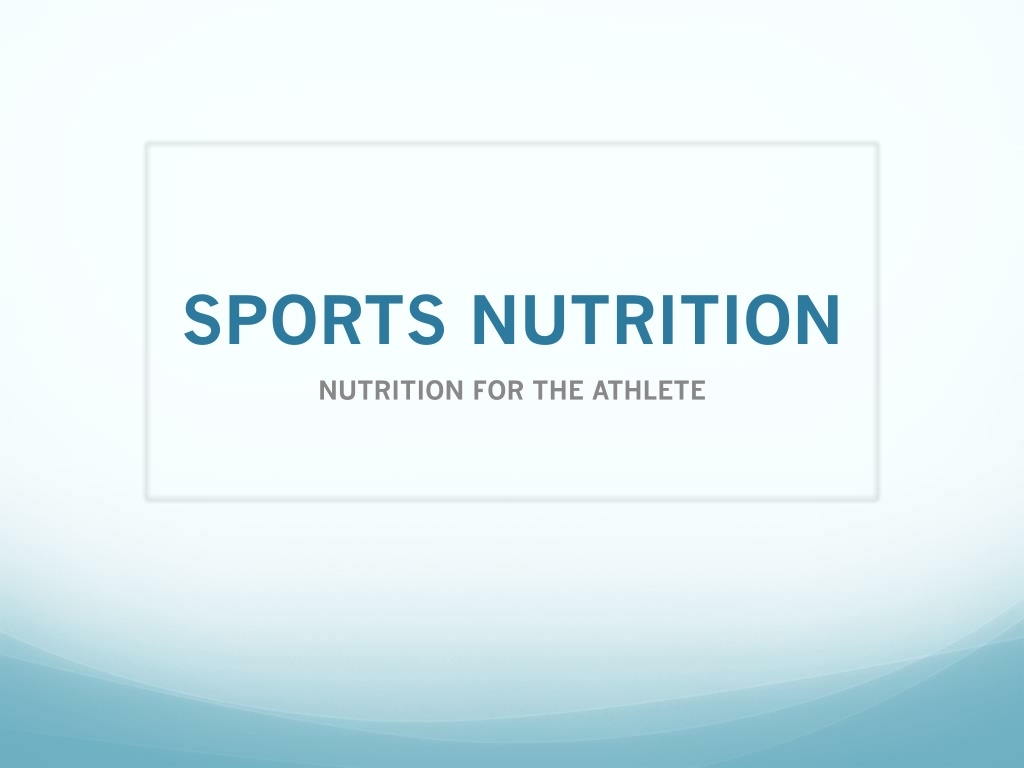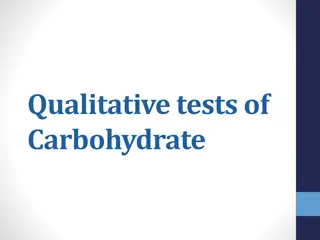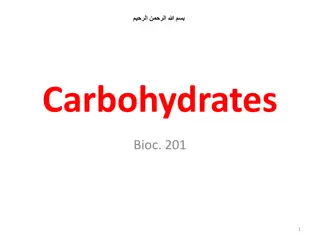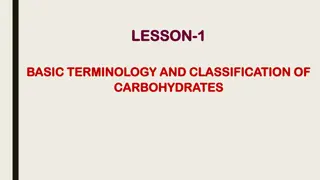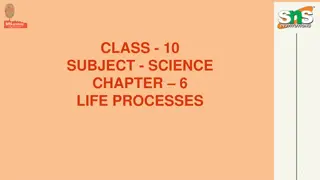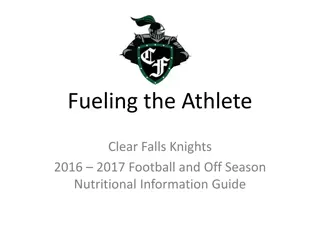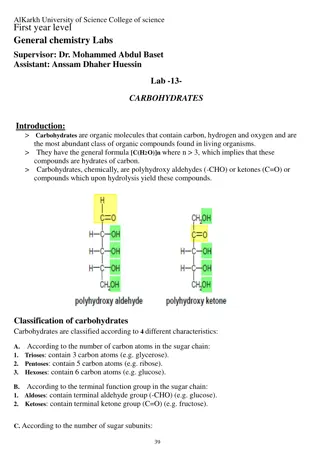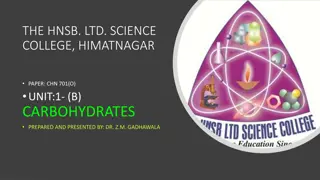Role of Carbohydrates in Sports Nutrition
Sports nutrition for athletes depends on additional energy expenditures specific to their sport. Carbohydrates, the body's primary energy source, can be found in grains, fruits, vegetables, beans, and dairy products. Athletes need to consume 55-60% of their daily calories from carbohydrates, with considerations for size, gender, sport, and diet. Proper carbohydrate intake fuels active muscles, prevents low blood sugar, and improves performance, while excess carbohydrates can be stored as fat for later energy use.
Download Presentation

Please find below an Image/Link to download the presentation.
The content on the website is provided AS IS for your information and personal use only. It may not be sold, licensed, or shared on other websites without obtaining consent from the author.If you encounter any issues during the download, it is possible that the publisher has removed the file from their server.
You are allowed to download the files provided on this website for personal or commercial use, subject to the condition that they are used lawfully. All files are the property of their respective owners.
The content on the website is provided AS IS for your information and personal use only. It may not be sold, licensed, or shared on other websites without obtaining consent from the author.
E N D
Presentation Transcript
SPORTS NUTRITION NUTRITION FOR THE ATHLETE
Sports Nutrition Depends on the following Additional Energy Expenditures that are Needed Sport Specific Needs for: Team Sports, Power Sports, Aesthetic Sports, Endurance Sports, Winter Sports, Water Sports, Mixed Sports, Individual Sports Food Function with Type of Sport Training Tools to Improve & Prepare Athletes
Food & Functionality Energy = High & Low-fiber Carbohydrates Animal & Vegetable Lean Proteins Low-fat Fats Food Choices that Impact Performance = Eat a Variety of Foods Eat Nutrient Dense Foods Eat High Vitamin & Mineral Foods
Carbohydrates Carbohydrates are the body s primary source of energy. Dietary carbohydrates include: Grains, Fruits, Vegetables, Beans, Nuts & Dairy. These foods can be stored in the liver & in the muscles as glycogen to be used later for energy. Glycogen is a polysaccharide that forms into a glucose when it is hydrated.
Carbohydrate Recommendations . . . Minimum Amounts 5-7 oz. per day Athletes need to get 55 60% of their daily calories from Carbohydrates the same as non-athletes Considerations Size, Gender, Sport & Diet Caloric Density: Carbs are 4 cal/gram Carbohydrate Loading requires 8-10 oz. During Training use 30-60 grams of carbs/hr
Student Goal Tina is a 16 year-old Soccer Player, she is 5 6 & weighs 135 lbs. Her Carbohydrate Goal is: 305-365 grams/day Food Carbohydrate Grams 1.5 C Dry Cereal, 1 C Skim Milk, 1 Banana, 8 fl. oz. Orange Juice Breakfast 100 grams Turkey Sandwich (2 sl. Bread, 2 sl. Turkey, 1 sl. Tomato, 1 sl. Lettuce, Mayo & Mustard), 1 Apple, 2 Whole Grain Crackers, 1 C Yogurt 1 C. Chicken Stir-fry w/Vegetables, C Brown Rice, 1 C Yogurt w/ C Berries Total Lunch 130 grams Dinner 125 grams 355 grams
Carbs help the body by? If excessive Carbs are eaten they are stored as fat by the body but can be called upon later for energy to improve your performance. Carbs reduce the risk of hypoglycemia or low blood sugars. Carbs provide fuel for active working muscles. Carbs prevent bonking or hitting the wall & forcing you to slow down or stop during an event.
Carbs During Exercise Research shows that 40-60 grams of carbs/hr will help delay glycogen depletion & keep the body feeling stronger. Foods to eat during an event to keep the body strong: 1 medium Banana 25 g 1 slice Bread w/Peanut Butter - 20 g 2 Fig Newton Cookies 14 g 1 oz. Pretzels 20 g Roll w/1 Tbsp Jam 50 g
Tips to limit stomach distress Stay hydrated & practice drinking during training Avoid over nutrition both before & during events Keep pre-race meal moderate in lean protein & low in fat Eat a high energy, high carb diet regularly Avoid high fiber foods before exercise Limit anti-inflammatory meds, alcohol, caffeine, antibiotics & supplements before events Visit the Port A Potty before your event
Proteins Use Animal + Vegetable Sources Athletes need 15-20% of their daily calories from protein, which is a higher protein content than non-athletes. Caloric Density: Proteins are 4 cal/gram Build & Repair Body Tissue, Bone & Muscle Provide Immune Functions, Enzymes, Hormones & Antibodies Provide Vitamins & Minerals Help w/Transportation & Balance of Fluids
Protein Recommendations Girls need 5.5 oz/day & Boys need 6.5 oz/day Athlete Girls & Boys need 6.5 8.5 oz/day or 95 grams Protein-Rich Foods 1.5 C Skim Milk C Oatmeal 1 String Cheese C Almonds 1 C Plain Yogurt 2 Slices Deli Turkey 2 Tbsp Peanut Butter 1 Chicken Breast 1 Sports Bar Total Protein grams 12 grams 7 grams 8 grams 8 grams 10 grams 7 grams 7 grams 25 grams 10 grams 94 grams
Recovery Nutrition Well-balanced eating after a workout helps the body replenish lost nutrient stores, repairs damaged tissue & prepares for the next workout. When you eat matters it is very important. The body is primed to replenish lost glycogen stores within 4 hrs. Start refueling within 15-60 min after an event. Recovery is in 3 stages. Stage 1 - Snack + Fluids (15-60 min after an event) Carb drink (chocolate milk, Gatorade or smoothie w/fruit) Protein 10-15 grams (peanut butter sandwich, fruit yogurt or sports bar)
Recovery Nutrition Cont. Stage 2 Meal + Fluid (within 2 hrs after event) Balance mostly carbs, some lean proteins, few low-fat) Pasta w/tomato sauce, veggies & chicken; Turkey sandwich, whole wheat crackers & fruit; or Chicken stir- fry with brown rice & veggies. Stage 3 Snack + Fluid (within 4 hrs after event) Carb drink (chocolate milk, sports drinks, fruit waters, or smoothies) Protein 10-15 grams (crackers & string cheese; graham crackers w/peanut butter; or cereal w/low-fat milk) Certain types of training or competition require greater detail. 2 or more training sessions/day Less than 8 hrs between sessions Endurance training more than 90 min. Multi-Day competitions
Fats Sources include Animal Products (full fat dairy, meats beef, chicken, pork, fatty fish & egg yolks) Vegetable Products (nuts, seeds, avocados & olives) Processed Foods (cookies, crackers, baked goods & salad dressings) Vegetable Oils (olive, canola, peanut, sesame, walnut, safflower, etc.) Caloric Density: Fats are 9 cal/gram Athletes need to get 20-25% of their calories from fat. Athletes need a leaner fat content than non-athletes.
Fats help the body by? Providing lasting energy that can be used for walking, jogging & easy cycling Providing heat, insulation, protect our vital organs, start chemical reactions, aid metabolism, can improve heart health, & help with immune functions. Transporting fat soluble vitamins A, D, E, & K to the body to be used. Providing Omega-3 Fatty acids (flax seeds, walnuts, salmon), which are valuable nutrients & reduce body inflammation
Fats help the body by? Cont. When excessive fats are eaten they lead to: Heart Disease Obesity Diabetes Clogged Arteries Stroke Athletes should use healthy fats & limit their fatty meats, high fat Dairy products, Fried foods & Solid Fats
Hydration All individuals need water, a minimum of 64 fl. oz. a day. Fluids are found in most foods which helps the body to consume 64 fl. oz. Fluids help to regulate the body s temperature, regulate blood pressure, provide structure & lubricants for the body, maintain electrolyte balances, help with nutrient transport & aid in a quicker body recovery (dehydration delays recovery) As exercise increases, weight loss due to dehydration increases. A 2% weight loss can impair body performance.
Hydration cont. Allowing the body to become dehydrated can cause muscles to cramp, alter blood pressure & causes weight loss. Drinking too much water can alter electrolytes & cause hyponatremia low levels of sodium in the body which causes low blood levels. A good rule of thumb is to get 16 oz. of water with each meal. Carry a water bottle with you whether you are working out, working, at school, or doing whatever. Start to hydrate 4 hrs before any event. Drinking about 10-16 fl. oz during this time.
Hydration cont. Urine color darkens as dehydration increases, monitor urine color & lack of frequency. Fluid intake is influenced by: gender, age, body mass, outside temperature, sweat rate, altitude & type of sport involved in. How much should I drink? Always drink a glass of water, milk, or 100% juice at each meal. Drink more when adapting to a new environment (altitude, temperatures & humidity)
Hydration cont. Determine Sweat Rate: Step 1 Weigh yourself (minimal clothing, no shoes) before event. Step 2 Keep track of all fluids consumed during event Step 3 Weigh yourself after event (same clothing) Step 4 Find the difference & convert to oz. (1 lb. = 16 oz or 2 cups of fluid) Step 5 Add to the oz you consumed during the event Step 6 Determine hourly sweat rate: divide total oz lost by hrs of event
Sweat Rate Example Tim practices for 2 hrs & drinks 20 oz (2.5 cups) Steps Action Results 1 Weigh self before event 175 lbs 2 Keep track of fluids consumed 20 oz 3 Weigh self after event (same clothing) 172 lbs 4 Find the difference & convert to oz Lost 3 lbs = 48 oz 5 Add the oz consumed to oz lost 20 oz + 48 oz = 68 oz (8.5 cups) 6 Determine hourly sweat rate: divide oz lost by hrs in event 68 oz/2 hrs = 34 oz or 4 cups/hr lost
Supplements Athletes who eat a varied, nutrient dense diet, following the dietary guidelines & get 8 glasses of water a day do not need sports bars, dietary supplements, or sports drinks. Supplements include the following risks: Drug tests at events, Financial Burdens, Caffeine, FDA Non- tested ingredients, Health Risks, Quality Research, & Can Effect a Good Performance.
Pre-Game Meals Before the Pre-Game Meal, usually the night before: Have a meal that is high in carb-rich foods, moderate in lean protein & low in fat. Pre-Game Meal should: Be 2-4 hrs before the event Contain 8-16 oz of water Contain low-fiber foods Be familiar, not a new food & is easily digested Contain 1-3 grams of carbs/lb of weight Be Carb-rich: (rice, cereals, pasta, bread, fruits, potatoes, corn, peas, & squash), Lean-proteins (chicken, turkey or fish) & Low-fat (skim milk, low-fat yogurt, avocados, nuts & seeds) Should take into account: duration of event, gender, body mass, age, sport & energy needs
Pre-Game Meal Examples Breakfast 1-2 cups Rice Chex Cereal w/1 cup skim milk Low fiber Carbohydrate Vegetable Protein 1 cup sliced Strawberries Low fiber Carbohydrate 1/3 cups Almonds Vegetable Protein Low-fat Fats 8 oz glass of water Hydration Write 2 more Different Breakfasts Use the following format for a Pre-Game Meal & plan 2 breakfasts using the following grid.
Pre-Game Meal Examples Lunch Pasta Salad (1 cups cooked pasta; 1 cup vegetables (carrots, tomatoes, celery, olives, broccoli & peas); cup meat (tuna, chicken, or salmon); 1.5 Tbsp vinaigrette dressing) Low-fiber Carbohydrate Lean Animal Protein Low-fat Fats Dinner Roll Low-fiber Carbohydrate Slice of Watermelon Low-fiber Carbohydrate 8 oz glass of Water Hydration Write 2 more Different Lunches Use the following format for a Pre-Game Meal & plan 2 breakfasts using the following grid.
Pre-Game Meal Examples Dinner Turkey wrap (2 slices of lean turkey, romaine lettuce, tomatoes, avocados, olives, cucumbers, celery, tortilla, mozzarella cheese) Low-fiber Carbohydrate Lean Animal Protein Low-fat Fats 1 cup low-fat yogurt w/ cup fruit Lean Protein Low-fiber Carbohydrate cup snap peas Low-fiber Carbohydrate 8 oz glass of Water Hydration Write 2 more Different Dinners Use the following format for a Pre-Game Meal & plan 2 breakfasts using the following grid.
